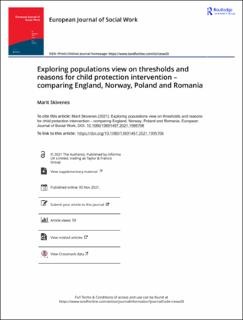Exploring populations view on thresholds and reasons for child protection intervention – comparing England, Norway, Poland and Romania
Journal article, Peer reviewed
Published version

Åpne
Permanent lenke
https://hdl.handle.net/11250/2983028Utgivelsesdato
2021Metadata
Vis full innførselSamlinger
- Department of Government [473]
- Registrations from Cristin [10412]
Sammendrag
This explorative study examines citizens' views on restricting parental freedom to protect children's rights in England, Norway, Poland and Romania. Are there differences in popular views in these four welfare states with different child protection systems, family policies, and approaches to families and children in vulnerable situations? Experimenting between four different parenting problems (unsatisfactory care; alcohol misuse; mental illness; intellectual disability) the findings show that citizens in the four countries have quite similar perceptions of government responsibilities in relation to children suffering from unsatisfactory parental care or parental alcohol misuse. A large majority agree with restricting parental freedom, and a majority agree with intrusive interventions to secure the welfare of the child. There are mixed results on national differences between the east European countries and England and Norway. All, except Norwegians, showed effects on type of parental problems (unsatisfactory care; alcohol misuse; mental illness; intellectual disability) for agreement on type of interventions, indicating that citizens expect differential treatment of parents' dependent on the reason for negligent care of children. Perhaps the Norwegians does not differentiate because they regard the risk to the child as similar regardless of parental problems, which may reflect a child centrism in the Norwegian population.
